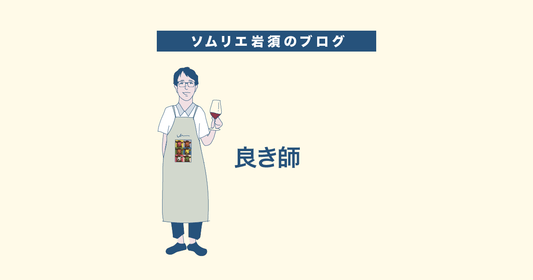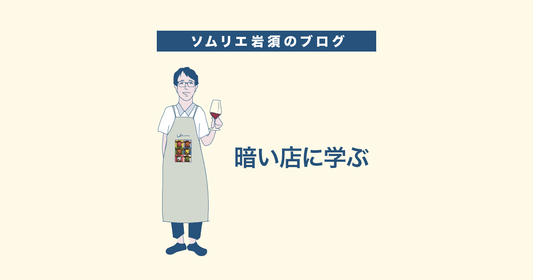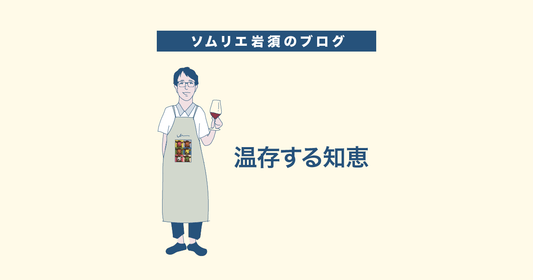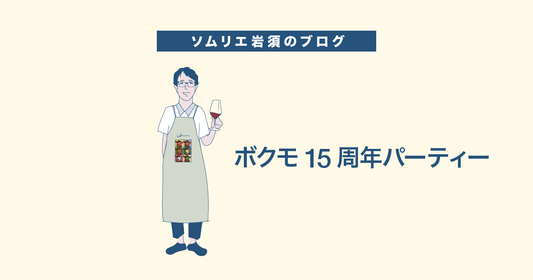
As someone who works in the restaurant industry, helping customers choose wine is a part of my daily routine.
A sommelier is like a batting pitcher. Their job is to pitch the ball to a place where the batter can easily hit it, so that they can hit it comfortably.
"Please give me a wine that goes well with this dish."
"I'd like a crisp, dry white wine."
"I like a slightly heavy red."
I aim the ball at your strike zone and ask, "What do you think of this ball?"
Crack!!
The customer who hit the home run was all smiles. "Awesome!"
If it's a hit, that's a passing grade. "That's good."
If the ball isn't in the strike zone and you think, "Hey, that was a complete ball," then he's a bad pitcher.
Throwing a hard fastball that can't be hit is also not allowed, as it would make people think, "What's the point of you standing out behind the scenes?"
I've been a batting pitcher for 12 years, and in terms of batting average, I feel like the batting average is about 60% of the time these days (sorry if I'm being conceited).
Why?
I think the biggest factor is that my shop, Bokumo, has been promoting itself to the outside world as a "New Zealand wine shop" for the past few years.
If the message that we sell New Zealand wine gets through to customers, we will see an increase in responses like, "What is New Zealand wine like?" or "I came here to drink New Zealand wine." In other words, the percentage of customers who "come to the store with the intention of selling New Zealand wine" will increase.
This will increase the chances of us meeting your expectations.
For example, a batting pitcher might say, "I only throw high fastballs," and the spectators would say, "Okay, I like high fastballs, so I'll go and swing."
Well, that's a bit of a harsh baseball analogy, so I'll stop here.
In other words, if you declare that your product is niche, people will come to you looking for it.
So, the people who are preparing the event should make sure they have everything that will please those who like that niche. That way, satisfaction will naturally increase. It's easier to do if you have something unique.
And then, the Sunfish & Emergency, which I did several times. While running a restaurant, I also started a wine shop.
"Oh! Maybe a wine shop could help you choose wine in the same way!"
With this in mind, we came up with the following project for the Bokumo Wine crowdfunding campaign we conducted recently.
[Your Own New Zealand Wine Set] (2 types: 20,000 yen set and 30,000 yen set)
This set allows you to choose a wine brand while consulting with me, either face-to-face or online. A total of eight people have supported me (purchased it). Thank you. Niche is amazing!
Some people came to the store to have their consultation, some did it via Zoom, and some called in by phone.
And as of yesterday, consultations with seven out of eight people were completed.
My impression was, "I'm glad I did this project!"
In fact, in restaurants, it is difficult to take a lot of time to ask customers about their wine preferences. Because there are other tasks to be done, the basic rule is to make a quick decision in a tight discussion. I often felt frustrated and thought, "Ah, I wish I could have listened to the customer's preferences a little more."
However, this time, we had a one-on-one, face-to-face conversation, so it was much easier to understand the customer's preferences!
This time, I prepared a list of questions in advance and proceeded with the discussion while having them answer those questions. This was also a good idea. Well done, I did it.
The question list looks like this:
- How often do you drink wine?
- Will there be any NZ wines included in that?
- Do you drink it with meals?
- Do you have a favorite food, Japanese, Western or Chinese?
- What do you like: sparkling, white, red, rosé, orange?
- Light, medium, heavy, easy, strong - which do you like best?
After the questions were finished, we first asked them what kind of wine they liked within their favorite genre (sparkling, white, red, rosé, orange) and then decided on a brand. Next, their second favorite genre. After that, something they wanted to try that was a bit adventurous. That's how we went about it.
When asked what I recommend, I choose my top pick that matches my tastes, and also introduce contenders and dark horses. I think having a choice makes it easier to understand.
When deciding on the last item, I would suggest something that fit perfectly within our budget, but there were also times when I would think, "I wish we'd given up on the previous one and started over with the last two."
It's like going shopping together and then putting things back on the shelf and reconsidering them. It's like a game!
Finally, when the lineup was decided, I felt like we had accomplished something together (although maybe it was just me).
And it was fun to see so many different people consulting with me.
Some people were trying New Zealand wine for the first time, while others had tried it before but had forgotten about it. There was even one expert who had lived in New Zealand before and had toured wineries there.
He sent me a list of New Zealand wines from his home cellar in advance and said, "Anything other than this?" I thought he was the toughest of the tough, and was intimidated, but he turned out to be a really kind person.
Anyway, each person has different strengths, so I learned a lot.
However, unlike restaurants, in a wine shop you can't see the customer's reaction when drinking, so I'm a little worried. How will it taste? Will it be as expected, or will it be a disappointment? I'm still curious. I'd be grateful if you could let me know your impressions at a later date.
However, when it came to "choosing something that I was satisfied with" after trying it out, I felt that I was able to throw about 70% of my pitches in the strike zone, but I'm not sure.
While we were talking, I thought I heard the sound of the pen hitting the center perfectly, but I wonder if I was imagining it.
Oh no. In the end, I went back to baseball.
This week's wine and snacks
Southern Cross Hawkes Bay Merlot Cabernet Sauvignon 2013 Southern Cross Hawkes Bay Merlot Cabernet Sauvignon 2013

It's quite rare to find a NZ wine with a mature flavour.
This is especially true for reasonably priced wines.
I've heard that red wine changes from fruit to earth over time, and if you think about it that way, you could say that this wine has just finished its fruit stage and is in the process of becoming earthy.
The fruity aroma fades somewhat, and a complex scent reminiscent of fallen leaves and leaf mold takes over the overall aroma.
good!
This old, affordable New Zealand wine that has a sense of maturity is a rare find.
(We sometimes serve wine by the glass at Bokumo too!)

What I had at home was kotetchan (grilled offal).
The more you chew it, the more flavor it releases; it has the taste of a lively young person.
And then, right after swallowing it, I pour down some aged red wine, and it's like, ``Ah, it's the relationship between a bouncy baseball-player type guy (hormones) and a dried-up but seductive mature woman (aged red wine),'' which at first glance may seem twisted.
In fact, they are a nice couple with a good balance of supply and demand!
...I was being a bit delusional.





